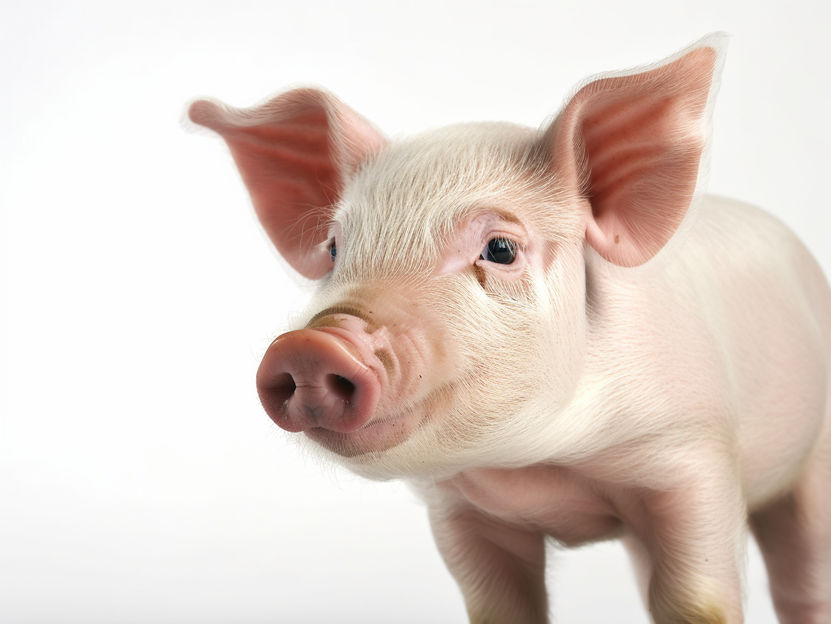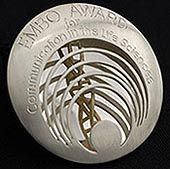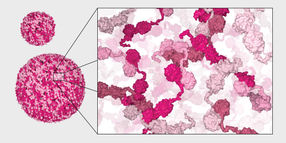Pigs as Organ Donors
New Findings on the Prevention of Retrovirus Infections
Advertisement
Intensive research is being carried out to enable the transplantation of organs from specially bred pigs to humans. However, the pig genome contains the genomes of various endogenous retroviruses (PERV-A, B and C) that could potentially cause infectious diseases. A research team at the Paul-Ehrlich-Institut has demonstrated in the Yucatan miniature pig breed (haplotype SLA D/D) that the retrovirus PERV-C could be reproductive and therefore infectious. The identification of the PERV-C genome now makes it possible to remove the PERV-C retrovirus genome from the pigs' genome via gene editing.

Symbolic image
Computer-generated image
Currently more than 8,500 patients are on the waiting list for organ donation in Germany. Organs for transplantation are so scarce that patients often have to wait a very long time for a suitable organ. In order to remedy this situation, many years of research have been conducted to explore the possibility of using specially bred pigs as organ donors. In 2022, the first transplant of a genetically modified pig heart was carried out in the US on a patient for whom no other therapies were available and who was not eligible for a regular organ transplant. The patient experienced complications 49 days later and died 60 days after transplantation. The causes of the organ failure are still being investigated.
Animal Organ Transplantation – Risk of Retroviruses?
When transplanting an organ from a pig to a human (xenotransplantation) there is a risk that endogenous pig retroviruses – viruses whose genome is anchored in the donor animal's genome, namely in the genome of each cell of the pig breed – could be transmitted to the recipient in the form of reproductive virus particles and could cause diseases. The risk is especially valid in view of the fact that transplant patients receive drugs that inhibit the immune system (immunosuppression) in order to prevent organ rejection. Due to the anchoring of the retrovirus genomes in the genome of each of the pig's cells, it has not been possible to remove the retroviruses or breed donor pigs without retrovirus genomes.
Endogenous pig retroviruses are called PERV (porcine endogenous retroviruses). They are closely related to the retroviruses that can cause leukemia and immunodeficiency diseases in mice, cats or gibbons. It is therefore suspected that after transmission to humans, PERV could also trigger these diseases in these people.
Endogenous Pig Retroviruses (PERV) and Their Risk of Transmission
It has been shown that two PERV classes, PERV-A and PERV-B, can not only infect pig cell lines in vitro (in laboratory cell culture experiments), but are also capable of infecting and further multiplying in cell lines of different species, including humans. The retroviruses are polytropic, which means PERV-A and PERV-B can overcome species barriers and potentially infect humans after transmission. In contrast, PERV-C retroviruses primarily infect pig cells, but not human cells. However, it has been observed in laboratory experiments that PERV-C can recombine with PERV-A, resulting in PERV-A/C, which can infect human cells. Compared to PERV-A and PERV-B, PERV-A/C actually multiplies better in laboratory cell cultures.
A pig breed that seems particularly suitable for organ donation is the Yucatan miniature pig. The wild types (ancestors) of this pig were brought to Boston, USA, from Yucatan, Mexico, for breeding 60 years ago. The breed "haplotype SLA D/D" was generated in Boston over several years with a view to using the animals as organ donors for xenotransplantation. This breed has neither a fully functional PERV-A genome nor a fully functional PERV-B genome, so that no infectious or reproducible retrovirus particles are formed. Haplotype SLA D/D pigs can indeed be PERV-C genome carriers, but it had been hitherto assumed that the resulting PERV-C retrovirus particles are not replication-competent (reproductive) and not infectious, provided that the pigs are not infected with PERV-A.
A research team at the Paul-Ehrlich-Institut headed by Dr Ralf Tönjes, research team leader in the Transfusion Medicine, Cell Therapy and Tissue Preparations Section, investigated the question of whether PERV-C itself might also be competent in replication. In the characterisation of PERV-C from cells of the pig breed haplotype SLA D/D, they found that in vitro PERV-C is quite capable of replication and is infectious, i.e. it can reproduce in cell culture. This would pose a risk for transplants. The good news is that since these PERV-C genomes only occur once in the pig genome, a knockout – a switching off of these PERV-C loci – would be possible using genome editing, i.e. the targeted modification of the pig's DNA. Thus, there would be no risk of transmission of PERV during xenotransplantation of organs from PERV-C knockout pigs from the haplotype SLA D/D.
The current findings provide valuable information that serves as another step closer to suitable donor animals for xenotransplantation. The Paul-Ehrlich-Institut is responsible for scientific advice on and approval of clinical trials of xenogeneic drugs in Germany.


























































